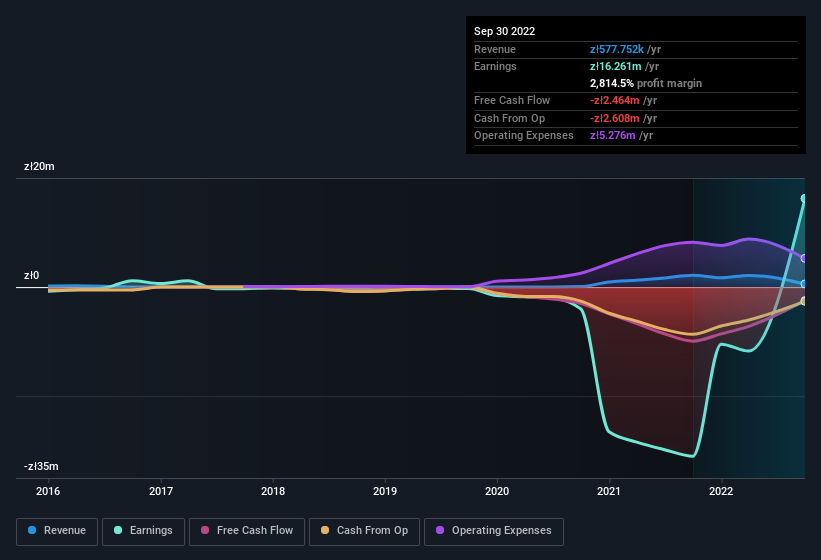- Poland
- /
- Capital Markets
- /
- WSE:LUD
We Don’t Think FinTech Ventures' (WSE:FIV) Earnings Should Make Shareholders Too Comfortable

Investors appear disappointed with FinTech Ventures S.A.'s (WSE:FIV) recent earnings, despite the decent statutory profit number. Our analysis has found some underlying factors which may be cause for concern.
See our latest analysis for FinTech Ventures

Examining Cashflow Against FinTech Ventures' Earnings
Many investors haven't heard of the accrual ratio from cashflow, but it is actually a useful measure of how well a company's profit is backed up by free cash flow (FCF) during a given period. In plain english, this ratio subtracts FCF from net profit, and divides that number by the company's average operating assets over that period. You could think of the accrual ratio from cashflow as the 'non-FCF profit ratio'.
As a result, a negative accrual ratio is a positive for the company, and a positive accrual ratio is a negative. While it's not a problem to have a positive accrual ratio, indicating a certain level of non-cash profits, a high accrual ratio is arguably a bad thing, because it indicates paper profits are not matched by cash flow. That's because some academic studies have suggested that high accruals ratios tend to lead to lower profit or less profit growth.
For the year to September 2022, FinTech Ventures had an accrual ratio of 0.33. Therefore, we know that it's free cashflow was significantly lower than its statutory profit, raising questions about how useful that profit figure really is. Even though it reported a profit of zł16.3m, a look at free cash flow indicates it actually burnt through zł2.5m in the last year. We also note that FinTech Ventures' free cash flow was actually negative last year as well, so we could understand if shareholders were bothered by its outflow of zł2.5m. However, that's not all there is to consider. The accrual ratio is reflecting the impact of unusual items on statutory profit, at least in part. The good news for shareholders is that FinTech Ventures' accrual ratio was much better last year, so this year's poor reading might simply be a case of a short term mismatch between profit and FCF. As a result, some shareholders may be looking for stronger cash conversion in the current year.
Note: we always recommend investors check balance sheet strength. Click here to be taken to our balance sheet analysis of FinTech Ventures.
How Do Unusual Items Influence Profit?
Given the accrual ratio, it's not overly surprising that FinTech Ventures' profit was boosted by unusual items worth zł23m in the last twelve months. We can't deny that higher profits generally leave us optimistic, but we'd prefer it if the profit were to be sustainable. When we crunched the numbers on thousands of publicly listed companies, we found that a boost from unusual items in a given year is often not repeated the next year. Which is hardly surprising, given the name. FinTech Ventures had a rather significant contribution from unusual items relative to its profit to September 2022. All else being equal, this would likely have the effect of making the statutory profit a poor guide to underlying earnings power.
Our Take On FinTech Ventures' Profit Performance
Summing up, FinTech Ventures received a nice boost to profit from unusual items, but could not match its paper profit with free cash flow. Considering all this we'd argue FinTech Ventures' profits probably give an overly generous impression of its sustainable level of profitability. So if you'd like to dive deeper into this stock, it's crucial to consider any risks it's facing. Every company has risks, and we've spotted 4 warning signs for FinTech Ventures you should know about.
Our examination of FinTech Ventures has focussed on certain factors that can make its earnings look better than they are. And, on that basis, we are somewhat skeptical. But there are plenty of other ways to inform your opinion of a company. For example, many people consider a high return on equity as an indication of favorable business economics, while others like to 'follow the money' and search out stocks that insiders are buying. While it might take a little research on your behalf, you may find this free collection of companies boasting high return on equity, or this list of stocks that insiders are buying to be useful.
New: AI Stock Screener & Alerts
Our new AI Stock Screener scans the market every day to uncover opportunities.
• Dividend Powerhouses (3%+ Yield)
• Undervalued Small Caps with Insider Buying
• High growth Tech and AI Companies
Or build your own from over 50 metrics.
Have feedback on this article? Concerned about the content? Get in touch with us directly. Alternatively, email editorial-team (at) simplywallst.com.
This article by Simply Wall St is general in nature. We provide commentary based on historical data and analyst forecasts only using an unbiased methodology and our articles are not intended to be financial advice. It does not constitute a recommendation to buy or sell any stock, and does not take account of your objectives, or your financial situation. We aim to bring you long-term focused analysis driven by fundamental data. Note that our analysis may not factor in the latest price-sensitive company announcements or qualitative material. Simply Wall St has no position in any stocks mentioned.
About WSE:LUD
Ludus
Operates an esports platform. The company provides services, such as e-wallet; courses, masterclasses, and private coaching; deals solutions; cashback; FIFA; fitness tracker; marketplace for NFTs; greets that allows communication; and banking solutions.
Adequate balance sheet low.
Market Insights
Community Narratives




